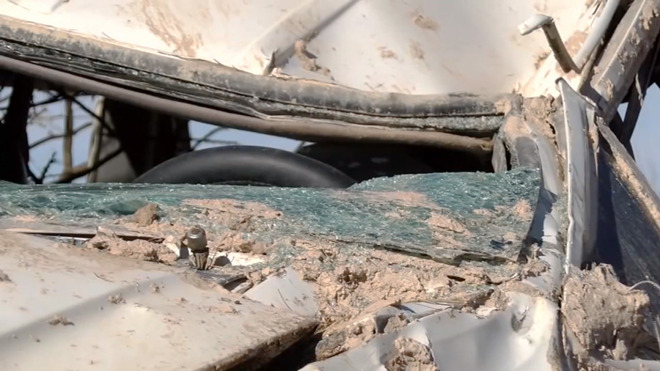Nevada man thanks Siri for surviving serious Jeep crash
A man who crashed his Jeep near Pahrump, Nev., credits Siri on his iPhone for saving him from paralyzing and potentially fatal injuries.

The Jeep flipped into a dry lake bed, Nate Felix told KSNV, paralyzing most of his body to the point that he couldn't raise his head. Though his dog helped keep him warm, Felix began to worry that he wouldn't survive the night -- Pahrump is a desert town, and temperatures can get dangerously cold during winter nights.
He then realized he could make a call through Siri, and tried several contacts. None of these worked until he said, "Hey Siri, call 911," which finally put him in touch with emergency services. iPhones are designed to call emergency services even without activation or when roaming on different networks.
Responders pried open the Jeep's door to pull Felix out, bringing him to a hospital where he spent four days. Doctors discovered he had broken two vertebrae with nerve endings for his arms and hands. Though he's currently restricted to a wheelchair, he's hoping to recover.
Apple regularly promotes the accessibility features of the iPhone for the disabled. One recent example is the case of Scott Leason, a blind U.S. Navy veteran who uses his iPhone XR's VoiceOver feature to prepare for daily surfing lessons.

The Jeep flipped into a dry lake bed, Nate Felix told KSNV, paralyzing most of his body to the point that he couldn't raise his head. Though his dog helped keep him warm, Felix began to worry that he wouldn't survive the night -- Pahrump is a desert town, and temperatures can get dangerously cold during winter nights.
He then realized he could make a call through Siri, and tried several contacts. None of these worked until he said, "Hey Siri, call 911," which finally put him in touch with emergency services. iPhones are designed to call emergency services even without activation or when roaming on different networks.
Responders pried open the Jeep's door to pull Felix out, bringing him to a hospital where he spent four days. Doctors discovered he had broken two vertebrae with nerve endings for his arms and hands. Though he's currently restricted to a wheelchair, he's hoping to recover.
Apple regularly promotes the accessibility features of the iPhone for the disabled. One recent example is the case of Scott Leason, a blind U.S. Navy veteran who uses his iPhone XR's VoiceOver feature to prepare for daily surfing lessons.

Comments
"I can search for 'Thank you, Siri' on your iPhone."
It's why we pay a 911 tax (at least in Canada, I'm not sure about you in the US.) The 911 call is routed through Bell Canada's network (ie, here in Canada, I'm not sure who carries it in the US) I once read. So Bell should be getting some of that 911 tax money in compensation for carrying those emergency calls.
To repeat, I was only referring to the AppleInsider statement that "the iPhone was specificially designed to call 911 even without a plan." All phones can do that. They may need a SIM, but that's a separate issue that neither AI nor myself was talking about. Sorry that I wasn't clear.
It's one of those Internet myths that folks care about the 70K "skills" Alexa can do. Yes, people have written various "skills" such as different fart sounds, but EVERY survey shows that Siri on Homepod can already do what the vast majority of people want their smart speakers to do, e.g., make calls, check on traffic, check on calendar, play music, set timers, read messages, control lights, etc. Of course, Siri does it without compromising your privacy and without having to listen to music or podcast with a tinny sounding throwaway speaker.
/s
Not Thanks God?
Why don’t you thank your dad and mum? Not thanking the paramedic, rescuing team, doctors, spouse, friends.
A great Apple campaign for entering healthcare market.
Try actually saying "thank you Siri" to your phone and see what actually happens. If you've ever actually used Siri, that is.
Thanks Siri is not exclusive. I imagine he thanked plenty of others.